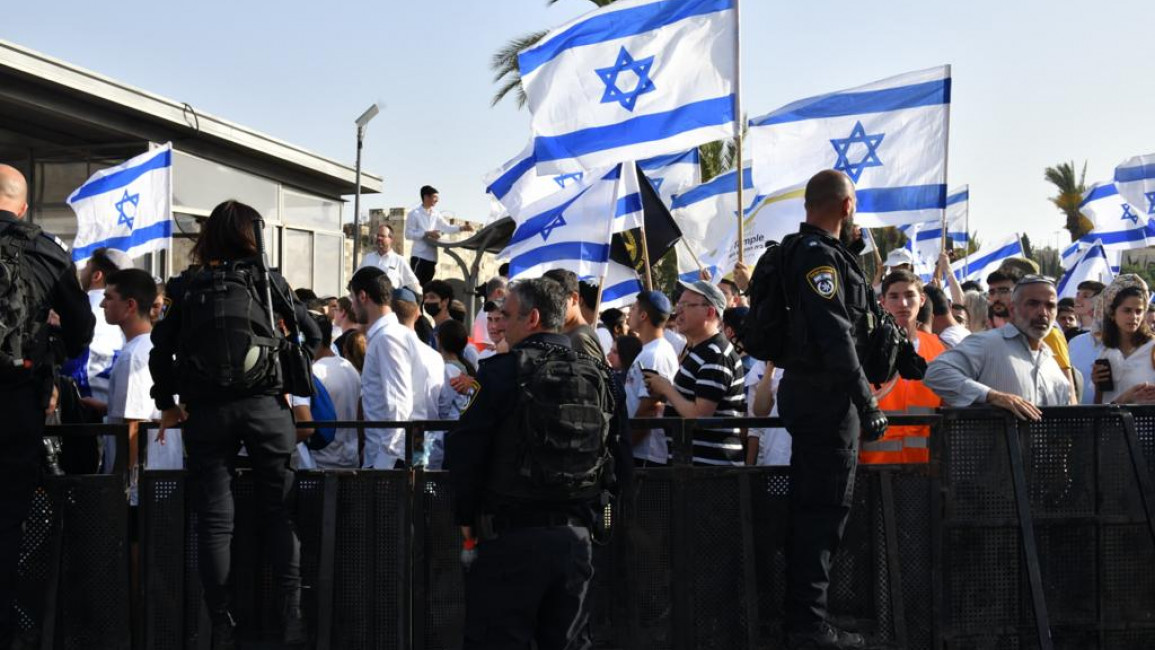What is Israel's provocative 'flag day' march and why do Palestinians oppose it?
Every year, Palestinians brace themselves as tens of thousands of Israeli nationalists rampage through the streets of Jerusalem, vandalising property and insulting or assaulting local residents.
Known as 'flag day', 'flags march' or 'dance of flags', the parade celebrates Israel's capture of East Jerusalem and the West Bank in 1967, which resulted in thousands of Palestinians being expelled from their homes and the last vestiges of their independence crumble.
On 18 May, Palestinians will be subject to another provocative 'flag march' - a cause celebre among the far-right in Israel, which has been recently emboldened by electoral successes in November that saw leading nationalist figures appointed to key government positions.
The marchers in Jerusalem on Thursday are no longer the fringe Israeli far-right "activists" of the past but men and women with real power and influence, including over millions of Palestinian lives.
What is the background to 'flag march'?
In 1967, Israel launched an unprovoked and surprise assault on East Jerusalem and the West Bank, which have remained under occupation ever since.
Far-right Israelis began celebrating, what they viewed as the "unification" of Jerusalem under Israeli control, in 1968, holding provocative rampages through the Palestinian eastern sector of the city annually, with Palestinian people and property a regular target. The parade often includes racist chanting, nationalist music, and dancing, while "death to Arabs" is a familiar cry from the marchers.
Israel's 'Religious Zionist' bloc views the capture of East Jerusalem - home to Jewish, Muslim and Christian sites - as a messianic event and dominates the contingent.
Many have also called for the establishment of a Jewish temple on the site of the Al-Aqsa Mosque compound - the third holiest site in Islam, which is regularly raided by settlers and other far-right activists.
Where does the march take place?
The parade passes through Jerusalem's 'Old City', the Palestinian-dominated neighbourhood, close to Al-Aqsa Mosque compound which is regularly raided by far-right Israelis.
Israeli men taking part in the flag march pass through the Damascus Gate into the 'Muslim Quarter' of the city, while women go through the Jaffa Gate, both converging on the Western Wall area.
Why is this year significant?
The flag march takes place this year amid the backdrop of violent Israeli settler and military raids in the West Bank, which have killed more than 150 people.
Last week, Israel also launched a wave of punishing air raids on the densely-packed Gaza enclave killing at least 31 Palestinians.
It also comes with the "most right-wing government" in Israel's history in power, including leading figures in the nationalist movement that coordinate flag marches and the stormings of Al-Aqsa.
National Security Minister Itamar Ben-Gvir and other far-right ministers stormed the Al-Aqsa compound earlier on Thursday and are expected to take part in the parade.
What do Palestinians and other Arab governments say?
Palestinians see the parade as a provocation, aimed at rubbing their noses in a military defeat that saw them lose their homes and freedom.
It also also viewed as part of ongoing efforts by Israel to enforce their stranglehold and project their dominance over Jerusalem's Palestinian residents, who live under a humiliating occupation.
However, Muhammad Abu El-Humos, a Palestinian activist, explained to The New Arab that despite the triumphal tone of the marchers, it is also a sign of Israeli weakness.
"This march is proof that the Israelis do not feel they have sovereignty over East Jerusalem, their sovereignty is lacking," he said.
"The march is proof that Jerusalem is occupied not united look how at the thousands of police members the military build up. Al-Quds is Palestinian to the highest degree."
Jordan, which is custodian of the holy sites in the Israel, slammed the storming of Al-Aqsa and the march as a "provocation and unacceptable".



